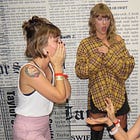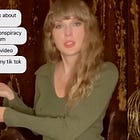When you’re a fan who hates the fandom
Don’t worry, I’m not like other Swifties.
Embedded is your essential guide to what’s good on the internet, written by Kate Lindsay and edited by Nick Catucci.
My ranking is 1) “Opalite” 2) “Fate of Ophelia” 3) “Elizabeth Taylor” and then put everything else into the trash can. —Kate
New on ICYMI: Saudi Arabia just bought The Sims, and now an entire community is at risk.
Head over here to subscribe to ICYMI wherever you listen to podcasts 🫶
Some of the most stressful times in my life have been during the rollout of a new Taylor Swift album. I have loved Taylor Swift since I was in middle school, when my friend first played me “Teardrops On My Guitar” on her CD player. Everything about that sentence is so old, which should underscore just how long Taylor Swift has been in my life. But as I’m typing this, I already feel the need to defend myself, to clarify—to make sure you know I’m not like other Swifties.
This isn’t out of some superiority complex or attempt to appear different. It’s because, over these past 15 years especially, the internet has completely changed what it means to be a fan of something. It’s no longer a verb you perform, but a group you’re a part of, even if that group doesn’t actually represent you at all.
This is why moments like this one, as the internet reacts to (and in this case, reels from) a new Taylor Swift album, are so stressful. I’ve branded myself as a fan, but in doing so, I unknowingly gave up my right to be my own spokesperson. Instead, it’s the behavior of the fandom as a monolith that I’m now accountable to. Certain takes, behaviors, and values have been automatically assigned to me. If I disagree, well then, am I even a fan at all?
The Swiftie fandom is certainly not the only one that suffers from this dynamic. It’s more likely than ever that something you love will be tainted by its internet community—become too closely associated with the behavior of people who actually have no relevance to the art itself. I raised this topic on Instagram, and got many examples. One person said they had “never encountered such a miserable fandom” as the one for The Sims.
But fandom extends beyond just entertainment. “Running has been truly incredible for my mental and physical health,” Semafor’s Max Tani says. “But getting more into running has unfortunately put me in greater contact with runners, who are an embarrassing group of people generally,” due to their jargon, dumb race signs, and “stupid little vests.”
Like me, many fans feel the need to differentiate themselves from the others the moment their interests are revealed. “Bob Dylan, David Foster Wallace, Frank Miller, Alan Moore, Mach-Hommy, Scorsese … all men whose works I love yet always feel compelled to clarify that I am Not One Of Those Shooters who’s going to go off about them at any moment or analyze them to death,” Slate writer Nitish Pahwa says. “My chivalric pledge is never to accost someone with a monologue about The King of Comedy without their express consent.”
In some cases, the behavior of the fandom has changed fans’ relationships with the thing itself. “I don’t openly engage with other fans unless they’re close friends of mine,” says Star Wars enthusiast Sarah Elgena. “[That way] I know they’re not going to say strange out-of-pocket sexist things about the characters that will just make me mad.”
The Swifties are a common punching bag. They’ve doxxed reporters, invented ludicrous conspiracies, had public meltdowns in the presence of her music, and contorted themselves into knots to defend her objectively bad behavior. The thing is: I don’t actually believe there’s a single Swiftie, let alone a majority of them, who has participated in all of these things. Rather, the community is defined by its most notable moments—and if you’re a group of women, in particular, then it’s often the moments when you’re at your worst.
These instances are then flattened into a single “brand” devoid of any rough edges. But it’s on those edges that some of the most meaningful fan relationships live. I know Taylor Swift’s music helped me through a number of heartbreaks, and I also know so many queer fans found and explored their queerness through sub-communities like Gaylor. It’s also a fandom that actively fosters a positive, welcoming IRL community. But this is what happens to anything on the internet, be it person or fandom: You have to be one thing, relentlessly staying on brand and on message no matter what around you changes (this is also the flaw of Swift’s recent music, but I digress).
The Swifties themselves have attempted to fix this. While r/TaylorSwift is fawning over Life Of A Showgirl, r/SwiftlyNeutral describes itself as a “refreshingly normal” place to talk about the artist, and engages with her content both positively and negatively. This happened in a different way with r/SeveranceAppleTVPlus after certain fans became exhausted by the ludicrous, as well as ludicrously obvious, theories that plagued it. They started r/okbuddyseverance as a way to parody the posts.
Fandom has never been unified, but only on the internet does it result in such embarrassment. Our interests are public-facing; we use them to signal status and to support our personal narratives. This is why it feels so important to make it clear where exactly our allegiances lie. I have my own monolithic personal brand to attend to, thank you very much. I can’t have that other one ruining my vibe.







I've been a Sims player since 2001, and the fandom has always been like this, it just used to be smaller and more contained. In the old days, it was rocked by fake-cancer scams, lolyers, and forum trolls. The first US presidential election I witnessed online was 2004, and it tore a tiny Sims forum apart. It was like Facebook in 2016. We all should have seen this *gestures to everything* coming.
This is why I generally like to keep the things I like to myself! Which is sort of sad because then you miss out on the camaraderie. But also then you can protect yourself from other people's annoying feedback. Also, I'll never understand why we've decided that in order to be a fan you have to believe a person's work in infallible. Perhaps this is also tied up in our culture's move away from criticism as an art form itself.